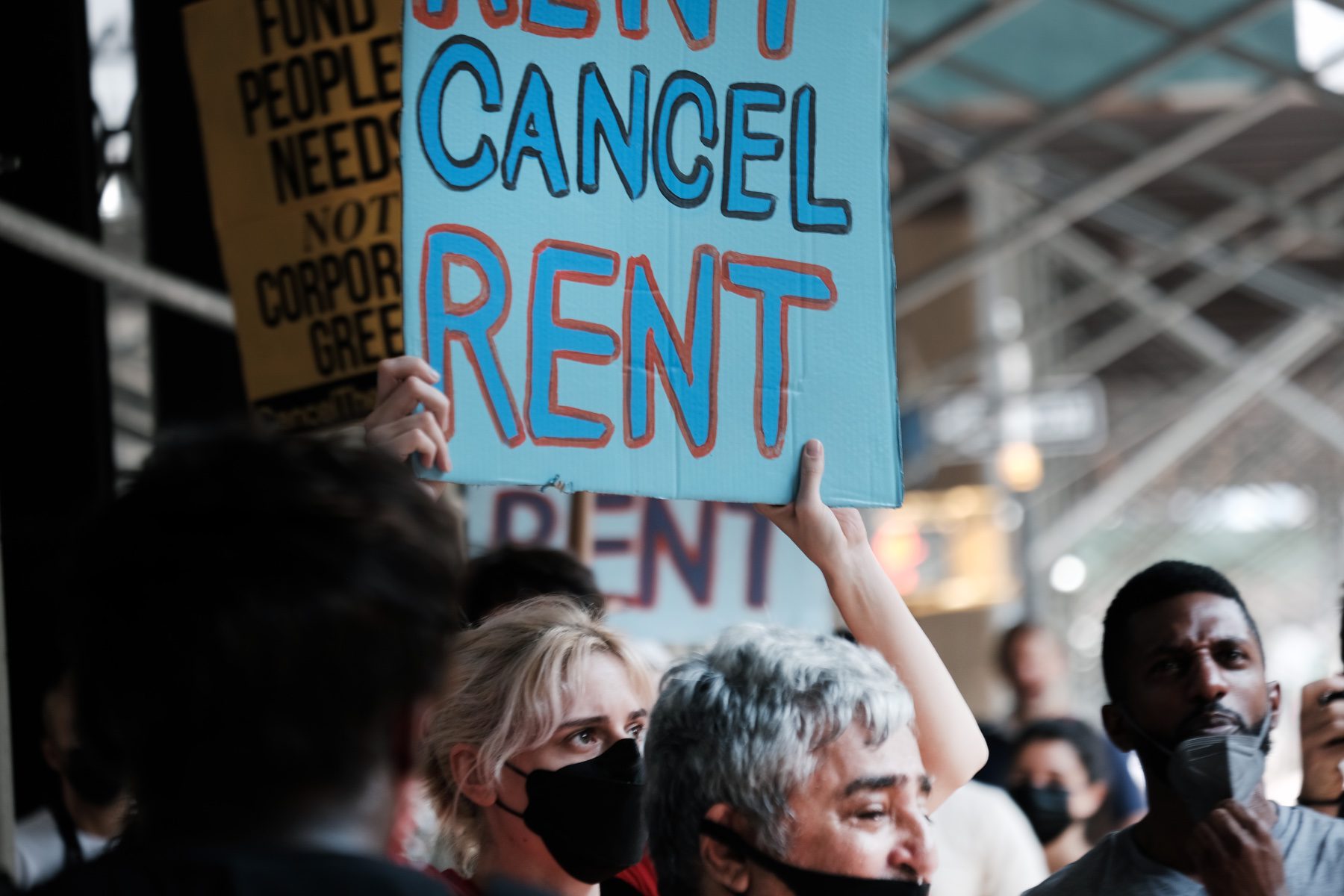The Supreme Court’s rejection of the Biden administration’s latest federal eviction moratorium puts millions of people in jeopardy of being removed from their homes, and women and LGBTQ+ people are particularly vulnerable.
The decision, effective immediately, stated that Congress must authorize a federal moratorium in order for the ban to continue. It follows a monthslong tug-of-war between the White House, members of Congress and the high court over protections for the millions facing housing instability during the COVID-19 pandemic.
“The decision is devastating because the consequences will be severe and long lasting,” Diane Yentel, president and CEO of the National Low Income Housing Coalition, told The 19th. “The eviction moratorium was a lifeline, and it was the last remaining federal protection that was keeping them safely and stably housed.”
Lawmakers also spoke out on the ruling. In a tweet, Missouri Rep. Cori Bush recalled her protest early this month to pressure Congress and the Biden administration to extend the protections. After Bush slept outside the Capitol for three nights, joined by activists and other lawmakers, the Centers for Disease Control and Prevention implemented this most recent moratorium, which was supposed to be in place until October 3.
“The Supreme Court failed to protect the 11 million households across our country from violent eviction in the middle of a deadly global pandemic,” Bush wrote in a statement. “We already know who is going to bear the brunt of this disastrous decision—Black and brown communities, and especially Black women.”
In an unsigned majority opinion, the justices wrote, “It is indisputable that the public has a strong interest in combating the spread of the COVID–19 Delta variant. But our system does not permit agencies to act unlawfully even in pursuit of desirable ends.”
Writing the dissenting opinion, Justice Stephen Breyer argued that “the public interest is not favored by the spread of disease or a court’s second-guessing of the CDC’s judgment.”
With congressional action unlikely to take place quickly and ongoing struggles to distribute federal funding to people in need of assistance with rental payments, here’s what you need to know about the ruling and efforts to provide relief.
What does the ruling mean?
The Center on Budget and Policy Priorities estimates that 11.4 million adult renters are behind on rent payments. Many of these people must now either pay whatever amount of outstanding rent they owe to their landlords or risk being evicted. Women and LGBTQ+ people, particularly those of color, are among the most susceptible to eviction and housing insecurity.
Prior to the pandemic, about 22 percent of all LGBTQ+ adults were living in poverty, compared to 16 percent of cisgender straight adults, according to 2019 data from the Williams Institute on Sexual Orientation and Gender Identity Law and Public Policy. Poverty rates were about 29 percent for transgender adults and 30 percent for Black LGBTQ+ people.
Among renters, about 20.3 of women overall, 29.4 percent of Latinas, and 32.3 percent of Black women reported being behind on payments in mid-January, according to the National Women’s Law Center.
What action could Congress take?
Congress could extend the eviction ban, but that will likely be an uphill battle amid opposition from Republicans and landlords who say the moratorium, first set in September 2020 to stop the spread of COVID-19, has put them at risk of going into debt or having to sell their properties.
Small landlords in particular, as opposed to large property owners, have been struggling during the pandemic and are also at risk of having to sell their rental units, Yentel said. This is why the National Low Income Housing Coalition and other advocacy groups called for the moratorium to be paired with federal money that can support landlords, she said.
Even with the federal protections in place, many still faced the threat of eviction. Landlords in some places have moved ahead with filing paperwork to have their tenants removed. In some counties judges have either undercut or declined to enforce the federal moratorium.
“A lot of it is the constant stress and being confused about the legal process, and they don’t really explain it to you,” Jesse Tingle, a renter, told The 19th’s Barbara Rodriguez about her experience going to eviction court about five times during the moratorium.
Where can people get assistance?
The primary source for rental aid is federal money. More than $46 billion in emergency rental aid was approved by Congress in December and March for landlords and tenants across the country, but just 11 percent of that has been distributed, according to figures released on Wednesday.
The National Low Income Housing Coalition tracks the nearly 500 programs in each state that are providing federal money for rent assistance. While states like Virginia and Texas have managed to distribute money efficiently to those in need,15 states have distributed less than 5 percent of their federal funds meant for rental assistance, Yentel said.
The challenge, she added, lies in complicated applications that may require extensive or burdensome documentation. A state like Virginia on the other hand has a simpler process, mobile applications and more equitable outreach.
From Yentel’s perspective, community organizations currently appear to be more focused with helping populations in need access and understand federal applications rather than actually providing funds. This could change, however, now that the moratorium has been blocked. The Consumer Financial Protection Bureau also has a site to help people with the relief application.
“The Treasury Department is strengthening existing guidance and implementing new policies to ensure that state and local grantees can further accelerate the distribution of ERA funds to struggling landlords and renters most at risk of eviction,” White House press secretary Jen Psaki said in a briefing on Wednesday. This acceleration includes allowing people to self-attest to their need for aid rather than having to provide extensive documentation.
Beyond the federal government, a number of states and cities also have their own eviction moratoriums in place that groups like the Eviction Lab at Princeton University keep track of.
The California eviction moratorium will last through Sept. 30, regardless of the Supreme Court decision. Renters also can apply for further relief through March 2022 via that program.
Former Democratic Rep. Beto O’Rourke shared a spreadsheet of rental assistance resources both specific to Texans and for others seeking help through federal organizations.
Officials across the country, including Massachusetts Attorney General Maura Healey, shared details about legal assistance for those facing eviction.
Housing instability may only grow as regional cases of the Delta variant continue to rise and jobs are at risk again.
In the aftermath of the Supreme Court’s decision, progressive Democratic lawmakers like Bush and Rep. Ayanna Pressley of Massachusetts expressed their determination to push for legislative solutions.
They urged House Speaker Nancy Pelosi and Senate Majority Leader Chuck Schumer to “act with the highest levels of urgency to advance a permanent legislative solution” that will extend the moratorium while there is still a deadly global health crisis. In a letter to the party leaders, they noted that even before the pandemic, evictions “have been a systemic form of violence that disproportionately impacted Black and brown communities, especially Black women.”
“Following decades of stagnant wages, skyrocketing costs of housing, health care and education, these same communities continue to bear the unequal burden of the compounding health and economic crises,” they wrote in the letter, signed by more than 60 members of Congress.
Legal and advocacy groups will also call for congressional action and assess other ways to help.
“The last thing we want to do is to end the pandemic, with renters having accrued more debt than they can pay off in their lifetimes, or with small landlords potentially having to sell their properties because they can’t keep up with,” Yentel said.
This story has been updated.







